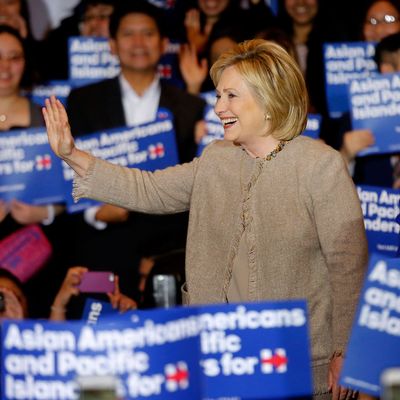
American Jews, Milton Himmelfarb wrote 60 years ago, “earn like Episcopalians and vote like Puerto Ricans.” Jewish Republicans have spent most of the time since then alternating between hopeful predictions that this anomaly would cease, and bitter recriminations as to why it persists. In recent years, Asian-Americans have joined Jews as a demographic curiosity, voting far more heavily Democratic than their aggregate income profile would suggest. Republican staffers Lanhee Chen and Tevi Troy have an op-ed in today’s Wall Street Journal that falls into the latter category, puzzling over the stubborn tendency of their brethren to forsake the GOP. Their answer is the insidious propaganda of the elite universities they attend.
“In the U.S. population at large, the possession of a college or postgraduate degree has been a predictor of Democratic Party affiliation. We believe, in particular, that the liberal leanings of many professors at elite schools likely play an important role,” they write. Chen and Troy urge young Jews and Asians to resist propagandization: “Now that you’re heading to university, you need not sublimate your own views to impress your professors or others around you.”
It is true that Jews and Asians are more likely than most groups to belong to the highest-earning one percent, which Republicans lavish with tax cuts whenever they gain power. It is also true that academia tends to lean far to the left of America as a whole. But the notion that Jews and Asians are suppressing their natural agreement with the party of Donald Trump in order to impress some liberal professor is wildly at odds with the actual forces at work in American politics.
Over the last several decades, the Republican Party may have been harnessed to a policy agenda that caters to the affluent, but its political coalition has been anchored to a cohesive ethno-nationalistic bloc of white Christians opposed to cultural change. Its political style is visceral rather than intellectual — think George W. Bush dismissing Al Gore’s statistics about his tax-cut plan by joking that his opponent “invented the calculator,” or any of the words that came out of Sarah Palin’s mouth, or, of course, Trump. The modern Republican Party has alienated people with higher education levels, not because they are sucking up to their liberal English professor, but because they expect politicians to consider science and evidence in their policymaking. The entire liberal wing of the Republican Party has defected. (Indeed, Episcopalians these days now vote like Puerto Ricans, too.)
It’s not an accident that the news network associated with this party annually whips up hysteria about a “War on Christmas,” or that Trump promises that his election will mean more people saying “Merry Christmas” rather than “Happy Holidays.” Obviously, people who don’t celebrate Christmas are not going to find that promise inspirational. But the voters on all sides understand that Trump is promising something broader than a different holiday greeting. Indeed, he isn’t actually promising that at all, since presidents have little power to change how we greet each other in December. What he’s promising is a restoration of an older social hierarchy.
One of the delusions of right-wing politics is the belief that Democrats are held together by “identity politics,” while Republicans appeal to their voters on the basis of abstract ideals. From that mistaken premise, the loyalty of various Democratic constituencies can be seen as a gigantic error. What this ignores is the degree to which Republican politics is also identity politics, and the lack of support from groups that don’t share its idealized identities is anything but strange.






























